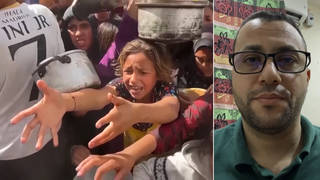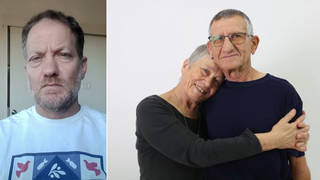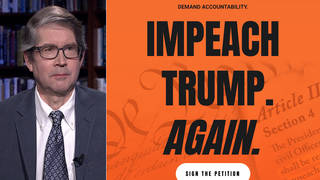
Guests
- Rashida TlaibDemocratic congressmember-elect in Michigan’s 13th Congressional District. Along with Ilhan Omar, she is the first Muslim woman elected to Congress. Tlaib is Palestinian-American.
On Tuesday evening, Palestinian American Rashida Tlaib in Michigan and Somali American Ilhan Omar in Minnesota became the first two Muslim women ever elected to Congress. Rashida Tlaib is a Democratic Socialist who supports the Palestinian right of return and a one-state solution. She also supports Medicare for all, a $15 minimum wage and abolishing ICE. The child of immigrants, Tlaib has spoken out against the Trump administration’s travel bans.
Transcript
AMY GOODMAN: This is Democracy Now! I’m Amy Goodman. On Tuesday evening, Palestinian American Rashida Tlaib in Michigan and Somali American Ilhan Omar in Minnesota became the first Muslim women elected to Congress. Rashida Tlaib is a Democratic Socialist who supports the Palestinian right of return and a one-state solution. She also supports Medicare for all, a $15 minimum wage and abolishing ICE. The child of immigrants, Tlaib has spoken out against the Trump administration’s travel bans. This is Rashida Tlaib celebrating her historic victory.
RASHIDA TLAIB: I want you to know my mom, who’s from a small village in the West Bank. They’re literally glued. It’s like 5:00 or 6:00 in the morning. And now it’s more than that. They’re glued to the TV. My grandmother, my aunts, my uncles in Palestine are sitting by and watching their granddaughter [inaudible]. I want to tell them—I want to tell them—I want them to know, you know, as I uplift the families of the 13th Congressional District, I’ll uplift them, every single day, being who I am as a proud Palestinian American and woman and Muslim.
AMY GOODMAN: In 2016, Rashida Tlaib made news when she confronted then-candidate Donald Trump at the Detroit Economic Club. She got up and shouted, “Have you ever read the U.S. Constitution?” She was taken out by security.
For more, we go to Madison Heights, Michigan, where we’re joined by Rashida Tlaib, the Democratic congresswoman-elect to Michigan’s 13th Congressional District.
Rashida Tlaib, welcome to Democracy Now! and congratulations. How do you feel? You have made history.
REP.-ELECT RASHIDA TLAIB: You know, it’s overwhelming, but it’s happy chaos, is what I describe it as. And I’m just ready to get to work. I feel like there’s so much at stake right now and very limited time for us to be able to change people’s lives. And I’m just ready to get things going and to provide neighborhood service centers throughout my district for the residents of the 13th.
As you probably know, Amy, I have been campaigning for nine months, and this is the third-poorest congressional district in the country, and the need is so great. And we haven’t had representation for almost a year now, with Congressman Conyers retiring earlier this year.
AMY GOODMAN: So, talk about your platform and what you helped to—what you hope to push through when you become a congressmember.
REP.-ELECT RASHIDA TLAIB: Well, a Justice for All Civil Rights Act is my first proposal that I’ve put forward. This is, you know, months of me listening to a lot of the residents within the 13th Congressional District. And, you know, one number one issue people might not even realize here in Michigan, and especially in my district, is that we have the highest car insurance rates in the country. My ZIP code 48227, literally, it’s the average of like $5,000, putting people—pushing people more into poverty, taking away access to jobs, in many ways, because they don’t have transportation, and we don’t have mass transit here in the metro Detroit area. And so, what came about by looking at this is the fact that Civil Rights Act of ’64, a historic act, that very much intended this kind of discriminatory practice, this car insurance redlining practice, to be a civil rights violation.
Well, what happened—and many people know this—over the last 50 years, after passing the '64 act, our courts got increasingly more conservative. They started watering it down. And now, for us to go up against corporations and others, we have to show this high threshold of intent, intentional discrimination. Well, the Justice for All Civil Rights Act that I'm going to introduce says, no, if we can show that the impact of that policy and that process that they’re using is discriminatory in practice, then that should be enough for us to say the rights of—civil rights of folks, within my district and around the country, is being violated.
Less than half of my families in the 13th Congressional District don’t own their own homes. The practices by banks currently, within—even just in communities of color, have now increasingly become more discriminatory. More and more of my residents don’t have access to lending, don’t have access to economic opportunities, equal access. And so, the Justice for All Civil Rights Act is transformative in that way, in that we can start looking at these processes and these structures, really, these very, very much strong structures and barriers within these kinds of corporations and the practices by many of their CEOs, as violations of people’s civil rights. And that alone will open up those doors and push back against things that I feel like are very much un-American.
AMY GOODMAN: On the issue of foreign policy—well, this certainly isn’t foreign policy, because your mother was standing right next to you as you were giving your victory speech Tuesday night. Your mother wears a hijab. Your family is Palestinian. You have expressed firmly your support for a one-state solution. Can you talk about how you will try to make this happen in the U.S. Congress?
REP.-ELECT RASHIDA TLAIB: Look, all of it has to happen organically. I mean, people on the ground need to want it. All I know is from my own experiences, is that, you know, from dehumanizing—I don’t care if it’s Israelis or Palestinians. The dehumanization of people, of human beings, that really just want to live with human dignity, want equality, want access to the same economic opportunities that even American families want, this is what’s lacking in the conversations when we talk about a lot about what’s going on in Palestine and what’s going on in some of the Occupied Territories and what’s going on even among Israelis, a majority of them, you know, thinking that maybe we can have a two-state solution. Maybe that’s the direction that many of them want. And if that’s what they want, then that’s their right to self-determine and to gain that.
What I can tell you is what I know from my own experience in the United States, looking at real American history. And that’s “separate but equal” doesn’t work. It didn’t. We tried it. But again, this is what is happening here in America, and we’re looking at our own history, right? I mean, that’s what I understood, is—you know, saying, “Well, you can only live here, can only work here. These are the hospitals that you should go to.”
You know, I keep thinking of my grandmother. Siti Muftiah is, you know, late in her age. She’s probably in her late eighties now. You know, she doesn’t know what year she was born. And when I talk to her, you know, she doesn’t think Israeli [inaudible]; she thinks, “This is where I live. This is where I want to be able to go to the hospital, get care that I want, to be able to farm my own land without getting harassed.” You know, right next to her home is a checkpoint. She never could have imagined having to be able to be checked before she could leave her home.
And those are the things that I will be able to do, is try to uplift her and many of the Palestinians that very much feel dehumanized. I can try to share those stories, that very much relate to the—you know, very much the stories I heard from my African-American teachers, who taught me about African-American history and why “separate but equal” didn’t work and why—you know, I really strongly believe that if we stop segregating, that we start integrating the schools there, if we start really talking to each other, not relying on, you know, looking at Trump’s America, which is so much like Netanyahu’s Israel, that if we stop talking about these divisive, hateful kind of messages that are coming through to so many people—and it is so much not what’s happening on the ground. I truly believe Israelis want the same thing. They want peaceful solution. And that may result in them trying to look at my grandmother and saying, “Yes, you deserve equal rights just as much as I do.”
AMY GOODMAN: Will you try to impeach President Trump?
REP.-ELECT RASHIDA TLAIB: Yes. I truly believe that he’s obstructing justice. It is very clear that something is wrong within our own government. You can like the man, but I could tell you, I know you like the rule of law more. And in America, there is laws that we all follow, that we all should equally be held accountable to. And I can tell you very strongly that this is not political for me. I mean, he could be a Democratic president, and I would still say the same thing: obstruction of justice.
And as an attorney myself, I can tell you, when we start kind of turning our heads and letting little bit of things slip by, like what we’ve seen the last few days, we are jeopardizing our own democracy. We are jeopardizing that accountability and that balance of government that’s there, that is so critical for us to live in a free country. We cannot allow him to taint this process, that’s there for a reason. And I’m very much willing to start investigating and leaning towards that, if he has anything to do with obstructing justice. And it pretty much sounds like he is trying to sway this investigation and trying to make sure that he protects himself instead of protecting our own country.
AMY GOODMAN: Will you support Nancy Pelosi, who has just announced she will go for the House speakership?
REP.-ELECT RASHIDA TLAIB: You know, I’m really so much focused on helping the other women of color. I mean, I don’t know if you know. It’s not just me and Ilhan Omar, but some of the youngest members of Congress, beautiful colors of women, are coming into the United States Congress, from Ayanna to Jahana to Deb Haaland to the beautiful Sharice Davids. We have such an incredible class that is coming in. I’m so focused on really trying to uplift and to lean on each other, to making sure that we are able to serve the families and the residents that believed in us back home very effectively. And so, we want to focus really on that and focus on making sure that we have a seat at the table, that we can truly be heard, not just displayed as like, “Oh, look, our caucus is now diverse. Great!” Now put us at a table where we could actually have a voice, where we can feel like we can make a difference in a lot of the issues that we feel is critically important for our families back home.
AMY GOODMAN: You’re a member of Democratic Socialists of America. Explain what democratic socialism is.
REP.-ELECT RASHIDA TLAIB: You know, for me, right now in Detroit, this is what it means. I have fought so heavily against corporate tax breaks, especially because I’ve seen our schools in Detroit close down. I mean, close to 60 schools have already closed down in the city of Detroit, while we’re channeling public money—you know, these are our own taxes—into a hockey stadium, the Red Wings hockey stadium downtown Detroit. Sixty percent of the funds that went towards that hockey stadium, that could have gone to schools—we’re talking about $400 million away from schools into an adult playground, a for-profit industry. That, to me, is completely unethical, immoral.
And for me, it means living in a just, fair, equitable society. And that is not fair when you have billionaires in the corporate welfare line, when our children are still hungry, when our schools are still underfunded, where I can’t even get, you know, our fire hydrants in some of our neighborhoods fixed, or I can’t even understand right now the lack of resources that we have to deal with the increasing concentration of poverty in many of the neighborhoods. It’s wrong and, truly, to me, against what I believe is the role of government, which is it should be about people, not corporations.












Media Options